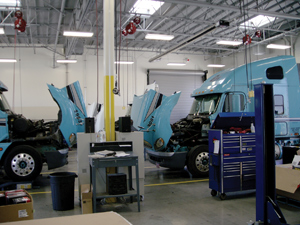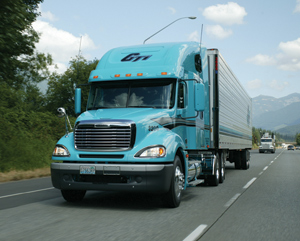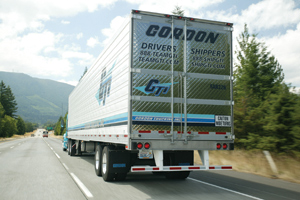 Effective specifications are helping Gordon Trucking Inc. continue a tradition of more than 60 years of growth and success.
Effective specifications are helping Gordon Trucking Inc. continue a tradition of more than 60 years of growth and success.
“We’ve had good experience with the equipment we operate,” says Kirk Altrichter, vice president, maintenance at Pacific, Wash.-based Gordon Trucking Inc. (GTI). “Once we’ve dialed in a spec’ that works from a company, driver, customer and maintenance perspective, we try to keep the fleet as uniform as possible.”
GTI’s approach to equipment spec’ing is perhaps most evident in the fleet’s 4,200 trailers. “We realize the needs of all of our clients are very different, so we provide a wide range of shipping solutions beginning with several trailer and loading options,” says Scott Gordon, who oversees the carrier’s reefer division. “Currently, the majority of the fleet consists of sliding tandem-axle 53-ft. Wabash National dry vans, but there are also 53-ft. fixed and sliding tri- and four-axle high cube and heavy-haul units for customers that need them. In addition, 300 of our trailers are 53-ft. Utility reefers.”
Well-versed in the GTI operation, Gordon has worked for the company since 1989. Among the roles he’s had are performing trailer service and collision repair work, and serving as a dispatcher, route planner and dispatch supervisor. Today, he also uses his experience to manage the company’s IT and HR functions.
When focused on GTI’s reefer fleet, Gordon works closely with Kirk Altrichter, a 17-year industry veteran who began his trucking industry career in operations at Schneider National and UPS. Altrichter has spent the past 10 years at GTI, first in operations overseeing driver managers and most recently as vice president, maintenance, for the company’s six shops and staff of 150, including 125 technicians.
Building intelligence
“We are always looking to take advantage of technology that makes sense for our operation,” Gordon says. “For example, while our reefers are not unique, we have equipped them with Qualcomm TrailerTRACS systems. With its remote set-point monitoring capability and the ability to alert our operations staff if something is not correct, we are building intelligence around the commodity we’re hauling, and leveraging the capability of our on-board tracking and communications as well.”
 Gordon and Altrichter are also currently evaluating refrigeration units for the GTI fleet, which now are mostly Thermo King models, including the latest SB-210s. When it adds 40 new refrigerated trailers to its fleet this year, however, the company is now considering spec’ing some Carrier Transicold X2 units.
Gordon and Altrichter are also currently evaluating refrigeration units for the GTI fleet, which now are mostly Thermo King models, including the latest SB-210s. When it adds 40 new refrigerated trailers to its fleet this year, however, the company is now considering spec’ing some Carrier Transicold X2 units.
“Fuel efficiency and maintenance costs have improved over time on our refrigeration units,” Gordon notes. “At the same time, we feel that by listening to end users, Carrier has resolved some issues we had previously with their units, so it may be time to try some of them in our operation.”
Another refrigerated trailer issue that Gordon and Altrichter are currently addressing is California’s 2004 Transport Refrigeration Unit (TRU) Airborne Toxic Control Measure (ATCM). Adopted by the California Air Resources Board (CARB), the measure aimed at reducing emissions from refrigeration units forces companies that operate refrigerated trailers to adopt new technology at seven-year intervals. Beginning on Jan. 1, 2010, model year 2002 and older TRU’s must meet new performance standards. 2003 TRUs must comply by the end of 2010 and the pattern continues for subsequent model years, with mandatory compliance by the end of the seventh year after each engine model year.
Effective planning
“Most of our reefers are in compliance, “Gordon states. “We have already replaced equipment that operates in California that was not compliant or moved it to intrastate operations elsewhere until its 10 year trade cycle is up. We’re probably going to replace the rest of the affected units, possibly on an accelerated cycle, but we’re not ruling out retrofitting as an option either. Overall, though, our planning has meant that we’re not as impacted as other fleets.”
 Another piece of California legislation—the emissions reduction plan known as AB 32 that was approved by CARB in December 2008––will impact the GTI fleet in other ways. The plan to reduce the state’s greenhouse gas emissions to 1990 levels by the year 2020 includes regulations that will increase use of fuel-saving and aerodynamic options.
Another piece of California legislation—the emissions reduction plan known as AB 32 that was approved by CARB in December 2008––will impact the GTI fleet in other ways. The plan to reduce the state’s greenhouse gas emissions to 1990 levels by the year 2020 includes regulations that will increase use of fuel-saving and aerodynamic options.
Under AB 32, there are now compliance requirements for new and existing 53-ft. and longer dry vans and refrigerated trailers. Compliance schedules for trailers set by CARB begin Jan. 1, 2010, when new 2011 model year dry vans must be certified or retrofitted to meet specifications under the U.S. Environmental Protection Agency (EPA)’s SmartWay Transport Partnership Program. Pre- 2011 model year trailers must be retrofitted by Jan. 1, 2013 or follow an optional phase in compliance schedule based on fleet size.
Refrigerated trailer compliance under AB 32 for existing 53 ft. or longer units takes place over three years. By Dec. 31, 2017, 2003 and 2004 model year trailers must comply with the regulations. For 2005 and 2006 models the deadline is Dec. 31, 2018 and for 2007 and 2008 units compliance is required by Dec. 31, 2019.
SmartWay approved technologies for trailers include aerodynamic devices and low rolling resistance tires, items identified by EPA as having the potential to help reduce fuel consumption and cut harmful emissions. “We’ve been involved with SmartWay since 2004,” Altrichter says. “Our trailers run on fuel-efficient tires and this year, after five years of working with various vendors to evaluate our options, we will start outfitting trailers with belly fairings and side skirts.”
Some of GTI’s 1,500 Freightliner Columbia and Cascadia tractors are also SmartWay compliant, Altrichter notes. In addition, all new tractor purchases, including a few hundred planned for this year, will be specified with full aerodynamic packages, fuel efficient tires and Thermo King TriPac auxiliary power units.
Good sense
 “Our tractors, which typically run five years and 600,000 to 700,000 miles in our operation,” Altrichter says, “average over three million miles a week in the U.S. and Canada, so for GTI the benefits of adopting fuel saving technologies are high.
“Our tractors, which typically run five years and 600,000 to 700,000 miles in our operation,” Altrichter says, “average over three million miles a week in the U.S. and Canada, so for GTI the benefits of adopting fuel saving technologies are high.
“With items like tractor and trailer aerodynamic devices, idling control devices and auxiliary power units, as well as speed management strategies, GTI has improved its fuel economy by 0.5 MPG,” Altrichter adds. “Partnering with SmartWay is also a natural extension of our efforts to be environmentally conscientious. Reducing fuel consumption and emissions makes good environmental and business sense.”
Recognized for its efforts, GTI was the recipient of the 2008 SmartWay Excellence Award. Among the reasons cited by EPA for this recognition were GTI’s purchase of aerodynamic vehicles, and its use of low-profile tires and synthetic lubricants. Also noted were the adoption of auxiliary power units to lower idling time, and monitoring idling time using on-board communications systems. Road speed governing and providing driver education related to more fuel-efficient driving habits were also on the list.
GTI was also recognized as the “Top Green Shop” in the nation in 2008 by Citgo and Fleet Equipment for GTI’s efforts to reduce waste, improve processes and become an even better environmental steward.
No stranger
Founded over 60 years ago, GTI is no stranger to successful programs and practices. GTI got its start in 1946 when Jay Gordon started Gordon Fast Freight. GTI is still privately owned and has three generations of Gordons involved in management. In 1984, current president and CEO Larry Gordon purchased the company from his father and formed GTI. Today, the carrier operates in the lower 48 states, Canada and Mexico through nine terminals in Washington, California, Oregon, Utah, Arizona, Wisconsin and Indiana, as well as 11 satellite locations in six western states.
While GTI has grown steadily, its fleet has also become increasingly more efficient. Ten years ago, its tractor fleet was roughly half the size it is today, while in the same period its annual revenues rose from $99 million in 1998 to $240 million in 2008. For Kirk Altrichter and Scott Gordon, that success is attributable directly to being dialed in to effective and efficient vehicle specifications.
